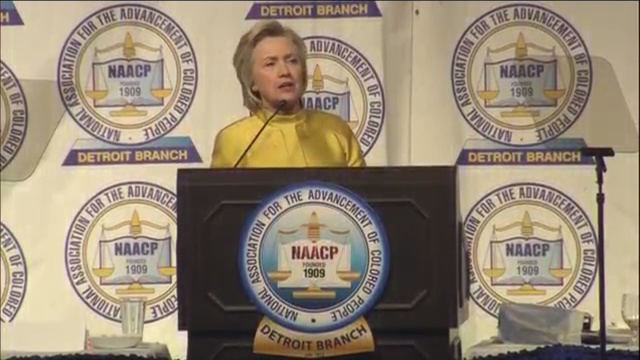AMY CHOZICK and THOMAS KAPLAN
With the Republican convention beginning in Cleveland with a theme of bringing law and order back to a fractured nation, Hillary Clinton told black leaders in Cincinnati on Monday that the country had “difficult, painful, essential work” ahead in rebuilding trust between African Americans and police officers.
“This madness has to stop,” Clinton told civil rights leaders and activists gathered at the annual convention for the NAACP, a day after three law enforcement officers were fatally shot in Baton Rouge, Louisiana.
President Barack Obama called for calm on Sunday, while the presumptive Republican presidential nominee, Donald Trump, asserted that the United States had become a “divided crime scene.” And Clinton on Monday fell somewhere in between, urging more empathy but insisting she would crack down on any violence against the police.
“We need to recognize our privilege and practice humility,” she said of white people. “Imagine what it would be like to sit our son or daughter down and have the talk about how carefully they need to act around police.”
She also urged more respect for police officers in the aftermath of the shooting in Baton Rouge and the ambush in Dallas that killed five officers.
“Let’s also put ourselves in the shoes of police officers, kissing their kids and spouses goodbye every day,” she said, vowing to bring “the full weight of the law to bear in making sure those who kill police officers are brought to justice.”
And in a line that seemed to echo Trump, she declared, “There can be no justification, no looking the other way,” in violence against the police, saying that law enforcement officials “represent the rule of law itself.”
Even so, Clinton’s comments on Monday represented a vastly different outlook than that her likely Republican rival and his allies were projecting across the state, at the party’s convention in Cleveland. The theme of Monday’s convention speeches is “Make America Safe Again,” and the speakers were expected to include Rudolph Giuliani, the former mayor of New York, who called the Black Lives Matter movement, which has protested the killing of black men by white police officers, “inherently racist.”
The Democratic National Convention next week in Philadelphia will include remarks by several African-American mothers who have lost children to gun violence or in clashes with the police and who have campaigned across the country on behalf of Clinton.
Clinton maintains some of her strongest support among African-Americans, 72 percent of whom said they would support her over Trump, according to a New York Times/ CBS News poll this month. Some 80 percent of black voters said they have an unfavorable opinion of Trump, compared to 21 percent for Clinton.
The NAACP had invited Trump to speak, but he declined the invitation, according to the group.
On Sunday, Trump’s former primary rival, Gov. John Kasich of Ohio, addressed the group. He talked about his record of overhauling the criminal justice system in the state, including helping nonviolent felons re-enter society.
“Every human being is made in the image of God,” Kasich said. “The Lord wants us to work together.”
In her speech on Monday, Clinton evoked in emotional terms the recent fatal shootings of two black men by police officers, Alton B. Sterling in Baton Rouge and Philando Castile in Falcon Heights, Minnesota, and said their deaths “drove home how urgently we need to make reforms to policing and criminal justice.”
She reiterated her call to overhaul the criminal justice system, which would include retraining police officers in the use of lethal force, supporting independent investigations into police shootings and lessening prison sentences for nonviolent drug offenders. “I pledge to you, I will start taking action on Day 1 and every day after that until we get this done,” she said.
Crime and policing have proved complex issues for Clinton. Many criminal justice experts view her pledge to tackle “systemic racism” in the criminal justice system and to prioritize the end of “the era of mass incarceration” as a repudiation of policies associated with her husband’s administration and the 1994 Violent Crime Control and Law Enforcement Act.
Back then, crime was a major concern in many American cities, and Democrats were still scarred by the 1988 presidential campaign, when the elder George Bush defeated Michael S. Dukakis after the Willie Horton ad portrayed Dukakis as soft on violent crime.
The 1994 law created stricter penalties for drug offenders and devoted billions of dollars to putting more police officers on the street and building new prisons.
From 1990 to 2014, the number of incarcerated adults nearly doubled to roughly 2.2 million. Speaking at the NAACP conference last year, former President Bill Clinton disavowed part of the anti-crime legislation he had once considered a top accomplishment. “I signed a bill that made the problem worse,” Bill Clinton said, referring to the many black men in prison for nonviolent drug offenses. “And I want to admit that.”
Hillary Clinton made clear on Monday that even if the criminal justice system were overhauled, the simmering racial tensions this summer have roots deeper than crime policy and policing.
“The truth is, we need to plan how we’re going to address the complex set of economic, social and political challenges we face,” she said. “Ending systemic racism requires contributions from us all.”
© 2016 New York Times News Service

